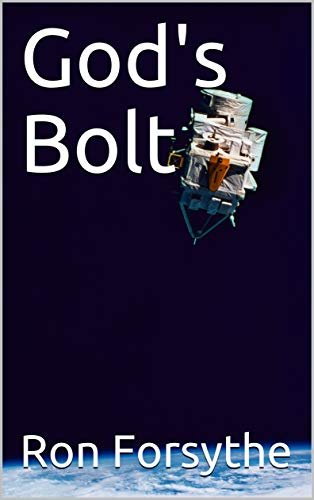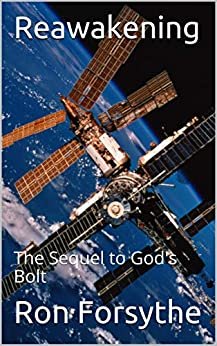book review: God's Bolt, by Ron Forsythe
When a novel begins with the total destruction of Earth and everyone on it ... where do you go from there?
In God's Bolt, Ron Forsythe goes to the only survivor: scientist Helen Southcote. Alone on a United Nations sponsored space station, she has to witness the asteroid impact that destroys the world, and live with the knowledge that she's the only survivor.
She doesn't handle it well.
Helen's only companion is an Artificial Intelligence running the station that she doesn't really like, and her only comfort the knowledge that the search for intelligence elsewhere, her life's obsession, was successful: There is life out in the rest of the galaxy. Unfortunately, it's so far away that it's no hope of rescue, and unlikely to even know of the Earth's destruction.

https://www.amazon.com/Gods-Bolt-Ron-Forsythe-ebook/dp/B07QB9CFJL
For the rest of the novel Forsythe flashes back to Helen's life, the creation of the space station's A.I., and the discovery of the massive asteroid that sneaks up on Earth, along with efforts to divert it. At the same time we follow Helen's recovery from despair. She's seen her friends and family all die, and is now stranded on a space station that can never land. The best she can hope for is to survive, alone, and watch the world burn beneath her.
Not the most upbeat life in the world. Still, God's Bolt is fascinating in the same way so many disaster stories are, even if the "Who will live?" question seems settled right from the beginning. The writing can be repetitive at times, especially when it comes to Helen's breakdown and the fight against the asteroid--I couldn't help thinking it wasn't necessary to say it was huge so many times, for instance. But it was an interesting, optimistic, look at what the world could be in a century and a half or so. Interesting enough that I was sad to see it go!
Helen is the main viewpoint character in God's Bolt, and I found her well rounded, especially as we get to follow her through her life and dedication to the search for extraterrestrial intelligence. That's a subject I assumed was an unnecessary side story, but just about everything is tied up at the end.
I also found the efforts to stop the disaster, complete with infighting in the world's government and the rise of a doomsday cult, to be fascinating, even knowing their efforts would ultimately fail. All in all a fun read, or at least as fun as planetary Armageddon can be.
By the way, improbably ... there's a sequel.

http://markrhunter.com/
https://www.amazon.com/-/e/B0058CL6OO
https://www.barnesandnoble.com/s/"Mark R Hunter"
That sounds quite similar to the movie I reviewed a little while ago, with Leonardo Di Caprio, "Don't Look Up". Just that this has intially a bit of hope in it - but no, they are doomed.
Would be interesting to see, what writers or movie makers in the 30s and 40s had said about such a story line. I cannot remember one movie where everything is going to hell at the end, from those days. Well, may be about the Alamo, but its really hard to make a happy end for that one...
But in general there was a consensus that a story has to end well, that evil is beaten, or at least that there is a silver line on the horizon.
Do we live in an era of hopelessness?
I think possibly we do, and that's sad because I'm a happy ending sort of person. I remember watching and then reading "When Worlds Collide" ... the earth was destroyed, but even then some of humanity managed to get to a safe place. There are still plenty of good stories to be told in which the evil is beaten and there's at least some hint of a better world beyond--but the entertainment industry hates that kind of story, as for some reason do most creators. Everybody celebrates "darker" ... I hate that.
Well, in a way I can understand the writers who look for a different kind of ending to stories. That "happy end" thing does have worn off a bit. It does make a story a bit too predictable, don't you agree? With that, you always know from the beginning that everything works out well, you just don't know how. Basically, like the original Star Trek series. Well, except for the unnamed guy in the red shirt, for him it doesn't end well...
So in a way I can understand that writers take different approaches lately, and I'm not against it. I found stuff like Dexter or Breaking Bad quite innovative, for example. That being said, they are not doomsday stories really, only on a personal level. But those "Asteroid destroys earth. The end." stories now are a bit weird.
No, I don't really agree--there are lots of ways to get to a "happy" ending, up to and including bittersweet endings, or endings that aren't happy so much as having an opening for the characters to work toward happiness. Having said that, if someone wants to put unhappy endings into their creations, that's their business! After all, I don't have to watch them.
But in the end it all depends on how they do it. Having a protagonist struggle hard to overcome all obstacles, and in the end just lose, isn't my thing. Emily and I read a Stephen King novel called "Cell" that we really liked--the ending was open ended as far as whether the protagonist succeeds, but it was still possible at the end of the book. Then we watched the movie version, and the ending was nothing but "everyone is dead now and it was hopeless all along". I'm a big NO with that.
Sure it also a matter of personal preference, to be more inclined to positive ending stories. No doubt there is enough depressing stuff going on in the world, that there is no need to invent some more.
And of course the "unhappy ending" stories are not a new thing - also here the old Greeks were first and called it Tragedy.
At the end of the day its more important what happens during the story, rather than how it ends. What I'm saying is just, that things are shown in a different way today, especially in movies and TV. In the past it used to be all black and white - not the picture, the story line - good vs. bad, and good always wins. And it was like that for decades.
But thats what people wanted to see and pay for, I guess.
Often it's a reaction to what's going on in the world--like how musicals and screwball comedies were so popular during the Great Depression. I love a good musical, too! But even those don't necessarily have a happy ending, as "West Side Story" shows.
True, in difficult times people prefer "light entertainment". So what does that mean for our time? Is it too easy? Doesn't seem so to me...
It depends on the creator, I suppose, but light entertainment doesn't have to be easy, at all. I give you "The Sound of Music", for example, a joyous musical--about escaping from Nazis.